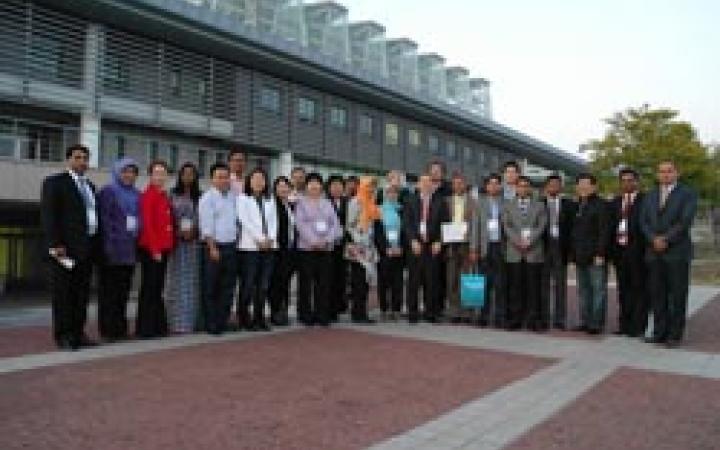30 March - 2 April 2011, Jeju, Republic of Korea. CIFAL Jeju convened over ten country delegations in Jeju Self-Governing Province, for its first training of a series to build local government capacities on priority Human Security issues in the Asia-Pacific Region. Part of UNITAR's global network of nine CIFAL training centres for local development, CIFAL Jeju's mandate is to develop knowledge and skills among regional local governments on this theme.
Jeju's international profile as an "Island of World Peace" has risen with it playing host to many Korean peace negotiations, security summits, and Peace Fora over the last decade. As a symbolic island of peace, human security, and green growth, it is also the home of three UNESCO World Heritage sites and a contender for the new Seven Wonders of the World.
With guest lectures and presentations from prominent academic, social media and UN representatives on child trafficking, CIFAL Jeju successfully completed its first training to build capacities for tackling Child trafficking among delegations from countries and regions such as Nepal, Pakistan, Sri Lanka, Mongolia, Indonesia, Taiwan Province of China, Cambodia, The Philippines and Taiwan Province of China. Participants hailed from a variety of cities, representing both source, transit, and destination areas for child trafficking victims among the region.
With a variety of presentations from regional experts representing Korea University, UNICEF East Asia and Pacific Regional Office, MTV Exit (the social media campaign to “End Exploitation and Trafficking”), the United Nations Inter-Agency Project on Human Trafficking, among other institutions, participants learned about common challenges and applicable good practices in anti-child trafficking efforts from across the region to better adapt their municipal programming.
A key priority for many local governments was how to build a local profile or baseline of child development to better monitor at-risk or vulnerable households that can potentially fall into trafficking and better service cases of child trafficking with complementary recovery and reintegration services for the victims. In many of the countries represented birth registration was a challenge, especially among the poorest of the poor households, exposing these children to trafficking and other abuses. Investing in monitoring and evaluation systems and baseline research of the state of children was highlighted as a challenge, but a future goal for many of the local governments.
Other lessons learned were that to effectively tackle child trafficking there has to be a focus on community-driven approach with public awareness, multi-stakeholder partnerships and civic education campaigns. Participants exchanged experiences on how they have build partnerships and city services with Universities, local NGOs, and other partners for a more sustainable and integrated approach to service victims or at-risk children.
Additionally, participants agreed that regulatory and policy frameworks that incorporate global and national legislation into an integrated governance approach for local governments is crucial to change the culture of impunity that allows trafficking to continue as a hardly prosecuted crime in many of the region’s communities. This highlighted the common challenge of inter-governmental coordination between national to local levels and the decentralization of responsibilities. In many countries, there were specific national bodies and institutions designated for human trafficking and child protection topics, and in some the national associations of local governments were also engaged in specific initiatives, such as in Nepal.
While many solutions and programmes were explored and participants contrasted these with practical comparative examples of effective child protection and victim reintegration activities, such as the “Child Friendly Cities” model, a common challenge was that financing for the sustainability of comprehensive local governments child services is a priority. This was especially so in the Mekong delta region, where household poverty is a key push factor for trafficking, luring minors to Thailand and other markets around the world for either labour, sexual, or other forms of exploitation.
Participants held focus groups to exchange lessons on how some cities, such as Indonesia’s cities, have consistent funding for anti-trafficking operations at the municipal level.
In 2011, CIFAL Jeju will continue to host introductory Human Security-themed training courses, as well as more specific workshops for developing Human Security plans and programmes across local governments in the Asia-Pacific region.
For more information contact: www.CIFALJeju.org or UNITAR’s Local Development Programme at ldp<a>unitar.org (please replace < at > with @ when you type the address).


